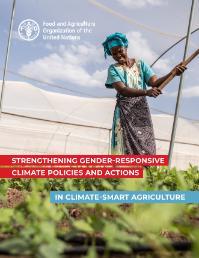Strengthening gender-responsive climate policies and actions in climate-smart agriculture
Abstract
Championing women as critical agents of change within their communities and in policy and decision-making processes at national and international levels is a fundamental step towards ensuring gender equality and climate-related issues are adequately addressed in agricultural policies and dialogue and considered by international climate finance mechanisms, government ministries and research institutions. Gender-responsive climate-smart agriculture refers to approaches that consider women’s and men’s specific priorities and their different access to resources, services, education and information to build climate resilience, through a focus on equality and agency.
This brief showcases promising research and innovation, particularly from countries engaged through the Food and Agriculture Organization of the United Nations (FAO) Flexible Multi-Partner Mechanism (FMM) 149 project. Senegal, Uganda and Belize are highlighted as examples to inform policymakers, guide gender-responsive investments, policies, and strategies in countries’ work in response to climate change.
This brief is part of a series. Other briefs on agrifood value chains, aquaculture and fisheries and the livestock sector are available.

